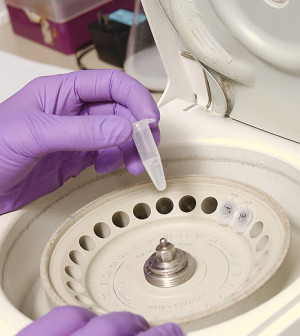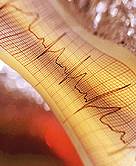- The Best Time of Day to Drink Bone Broth to Maximize Health Benefits
- 8 Ways to Increase Dopamine Naturally
- 7 Best Breads for Maintaining Stable Blood Sugar
- Gelatin vs. Collagen: Which is Best for Skin, Nails, and Joints?
- The Long-Term Effects of Daily Turmeric Supplements on Liver Health
- Could Your Grocery Store Meat Be Causing Recurring UTIs?
- Are You Making This Expensive Thermostat Error This Winter?
- Recognizing the Signs of Hypothyroidism
- 10 Strategies to Overcome Insomnia
- Could Artificial Sweeteners Be Aging the Brain Faster?
Add Heart Test to High School Athletes’ Screening, Cardiologists Say


THURSDAY, May 8, 2014Including a test of the heart’s electrical activity in screening programs for high school athletes increases the odds of detecting problems that can lead to sudden cardiac arrest and death, according to a new study.
Researchers looked at data on nearly 5,000 athletes, ages 13 to 19, at 23 Seattle-area high schools who underwent standard American Heart Association screening, including a heart health questionnaire and physical examination. They also received an electrocardiogram (ECG).
Twenty-three athletes were found to have significant heart abnormalities that required further evaluation. In seven of those athletes, the use of electrocardiogram led to the detection of heart problems that would not have been identified by the standard screening protocols.
The researchers noted that modern criteria used to interpret the electrocardiogram results led to fewer false-positive findings and more accurate detection of heart problems in the young athletes. The false-positive rate for electrocardiogram was under 4 percent, compared with about 22 percent with the heart health questionnaire and about 15 percent for physical examination.
The study was scheduled for presentation Wednesday at the Heart Rhythm Society’s annual meeting in San Francisco.
“The debate has mostly been focused on whether or not to include ECG screening, and this study shows it is not just about whether or not to include an ECG, but the importance of appropriate ECG interpretation in athletes,” lead author Dr. Jordan Prutkin, an assistant professor at the University of Washington School of Medicine Center for Sports Cardiology, said in a society news release.
“We need to focus future research on how we can further develop better athlete-specific interpretation criteria, which in turn will help reduce sudden cardiac arrest in the young population,” he added.
Research presented at meetings is considered preliminary until published in a peer-reviewed medical journal.
More information
The U.S. National Heart, Lung, and Blood Institute has more about sudden cardiac arrest.
Source: HealthDay
Copyright © 2026 HealthDay. All rights reserved.










